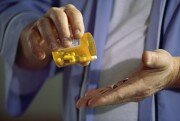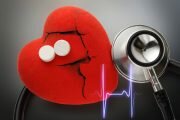Cholesterol – Your Doctor’s Advice Could be Damaging Your Health…
It’s time to bust a myth that could potentially harm your health, if it has not done so already… The idea that cholesterol is ‘bad’ is very much engrained in most people’s minds and it needs to be put to rest right now.
In the next two alerts I will show you how mainstream medicine have gotten the wrong end of the stick for the past 20 years and how cholesterol is an ‘invented disease’ used to spawn an entire industry of harmful cholesterol-lowering drugs.
Cholesterol has been turned into a villain when, instead of being your enemy, it is actually one of the building blocks for every cell in your body. Simple as that.
For those of you on cholesterol-lowering statins, hold on to your hats, because this information could change your life.
Cholesterol: Smoking gun
Apart from lining the pockets of the pharmaceutical industry for the past two decades, cholesterol has also been used to demonise entire categories of food like red meat, eggs and saturated fat… It gave birth to the myth that fat is one of the worst foods you can consume.
It’s become a household name that ignites fear for being one of the so-called ‘main causes’ of heart disease, heart attacks and early death…
Well guess what? Cholesterol probably won’t destroy your health…
In fact, you need cholesterol.
Cholesterol: In every nook and cranny
Cholesterol is a vital component of every cell membrane in your body. There can be no life without cholesterol.
This soft, waxy substance is found in every cell of your body and helps to produce cell membranes, hormones, vitamin D and bile acids that help you to digest fat.
To start with, the UVB rays in sunlight interact with the cholesterol on your skin and convert it to vitamin D. If your cholesterol levels are too low you won’t be able to use the sun to generate sufficient levels of vitamin D… and by now we all know that vitamin D plays a pivotal role in almost all aspects of our health… it’s been credited with helping to boost immunity, ward off cancer and much more…
So, if cholesterol is so ‘dangerous’, why would your body use it as a precursor for vitamin D and virtually all of the steroid hormones in your body? You cannot make oestrogen, testosterone, cortisone, and a host of other vital hormones without cholesterol.
It’s also found in your brain where it helps with the formation of memories and is vital for neurological function.
Not only does your body use cholesterol for all these different functions, but it also produces it!
That’s right, your body makes this stuff because it needs it…
Your liver and other cells in your body make about 75 per cent of blood cholesterol. The other 25 per cent comes from the foods you eat.
Cholesterol and inflammation
The main culprit behind heart disease and many other diseases, that cholesterol often gets the blame for, is inflammation.
There is in fact a very important link between cholesterol and inflammation, which I will come to in a moment…
Inflammation is your body’s natural response to invaders it sees as threats. If you get a cut for instance, the process of inflammation is what allows you to heal.
The following happens during inflammation:
* Your blood vessels constrict to keep you from bleeding to death
* Your blood becomes thicker so it can clot
* Your immune system sends cells and chemicals to fight viruses, bacteria and other ‘bad guys’ that could infect the area
* Cells multiply to repair the damage
Ultimately, the cut is healed and a protective scar forms over the area.
The same happens inside a damaged artery, except that the ‘scar’ is known as plaque.
Here’s the tricky bit…
The plaque and the thickening of your blood along with constricting blood vessels that normally occur during the inflammatory process, can increase your risk of high blood pressure and heart attacks…
Only now does cholesterol come in to the picture, so that it can do what it is designed to do and replace damaged cells. Remember that no cell can form without it.
When a cell is damaged, your liver will start to make more cholesterol and release it into your bloodstream. This biological process happens so that your body can produce new, healthy cells… and heal itself!
If damage occurs in your body on a regular basis, then you are in danger of suffering from chronic inflammation which leads to elevated cholesterol levels which quickly increases to try to keep the inflammation under control.
Testing for C-reactive protein (CRP), by having a simple blood test, is a much better indicator of heart disease risk than cholesterol tests, as CRP level is used as a marker of inflammation in your arteries. A CRP level under 1mgs per litre of blood means you have a low risk for cardiovascular disease, 1-3mgs means your risk is intermediate and more than 3mgs is high risk.
So, is it really cholesterol that’s the ‘bad guy’ here, increasing the risk of heart attacks, or is it the underlying damage to your arteries caused by inflammation? Should we all not go for regular CRP blood tests instead of cholesterol blood tests?
In tomorrow’s alert,Cholesterol: Why the Medical Mainstream Have the Wrong End of the Stick , I will discuss why low cholesterol levels are dangerous to your health. Also, find out why cholesterol-lowering drugs should be your last resort in trying to maintain a healthy heart.
Did you find this information useful?
Then why not get more expert health recommendations just like this delivered direct to your inbox?
"It is truly refreshing to read a newsletter on the topic of alternative medicine which is scientifically based and reviewed by professionals..." - Robert Sinott
We respect your privacy and will never share your details with anyone else.Bear in mind all the material in this email alert is provided for information purposes only. We are not addressing anyone’s personal situation. Please consult with your own physician before acting on any recommendations contained herein.
Sources:
American Heart Association January 23, 2008
Fallon, S. and Mary Enig. “Dangers of Statin Drugs: What You Haven’t Been Told About Popular Cholesterol-Lowering Medicines,” The Weston A. Price Foundation
Psychosomatic Medicine 2000;62.
Journal of the American College of Cardiology July 31, 2007; 50:409-418
Annals of Internal Medicine (1998;128(6):478-487) The Journal of the American Medical Association (1997;278:313- 321)
Annals of Internal Medicine October 3, 2006; 145(7): 520-530
IMS Heallth. IMS National Prescription Audit Plus July 2007
BusinessWeek.com, “Do Cholesterol Drugs Do Any Good?” January 17, 2008 (accessed June 10, 2008)










